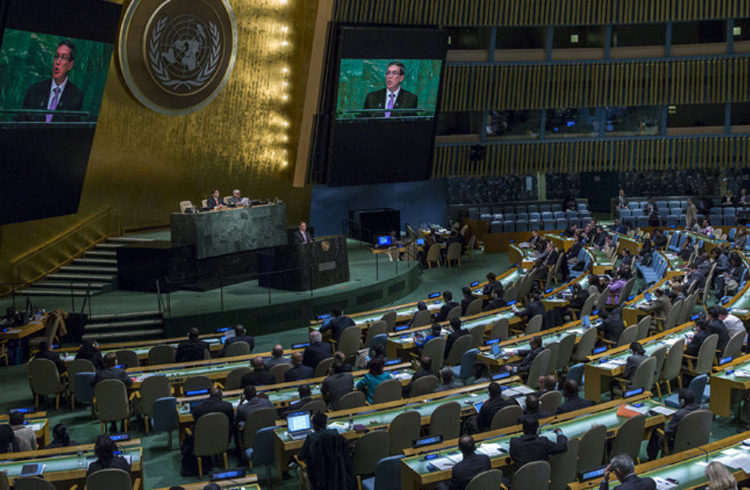For the 25th year in a row, the United Nations General Assembly will again vote on the U.S. blockade against Cuba. This October 26 the international agency will vote on a resolution calling for the lifting of an economic policy whose damages have been estimated at more than 753 billion dollars by the island’s government.
For more than 50 years there hasn’t been a lack of voices opposed to the blockade. In as well outside the Caribbean nation numerous institutions and personalities have harshly criticized not only its commercial and financial implications but also its human cost.
In the United States an organization like Engage Cuba is working to repeal the sanctions and restrictions of the so-called embargo, while the U.S. president himself has not doubted in describing it as obsolete and on more than one occasion has called on Congress to abolish what he considers a failed policy inherited from the Cold War.
Disregarded by a Republican majority legislative entity, Obama has then opted for applying executive orders seeking to dismantle aspects of the blockade at the reach of his presidential prerogatives. He has been doing this through a group of measures – the latest of them announced last October 14 – motivated by the spirit of making his country’s opening toward Cuba irreversible.
However, his intention has found many suspicions and obstacles. While in the United States the most conservative sectors – headed by presidential nominee Donald Trump and the radical wing of the Cuban community in Miami – attack what they consider are unjustified concessions toward the island, Havana considers the measures are insufficient and reproaches the limitations of what has been established until now.
Moreover, the Cuban government criticizes Obama for renovating the so-called Trading with the Enemy Act, a statute from 1917 that supports the economic blockade on Cuba and defends the fines imposed on U.S. and foreign entities for violating that policy. However, it barely refers to the fact that that deferral also has allowed the Democratic president to maintain his authority to weaken the sanctions on the island through the already announced presidential directives.
As lawyer Robert Muse, an expert in U.S. legislation regarding the largest of the Caribbean island, has pointed out, Obama would have done “something more dangerous” for his own strategy by allowing the expiry of that law, According to Muse, with more than 25 years of experience as an adviser, if he had done so the U.S. regulations would have come back “word for word, to the form they had in March 1996.” That means that the Helms-Burton Act would be submitted to the level of federal statute and would annul all the modifications made since then, including the most recent measures.
This year, as is usual when the voting in the UN General Assembly approaches, the protests against the blockade have multiplied in Cuba. Public meetings have taken place in workplaces, schools and communities throughout the country. To this is added a criticism to Obama’s most recent presidential directive, described as “interventionist” by the state-run press.
This accusation is not new or totally without foundation. However, the focalization of this aspect disregards the criteria of the Cuban government itself, which initially considered the document as a significant step in the process toward the lifting of the blockade and the improvement of relations between the two nations.
Josefina Vidal, general director for the United States of the island’s Foreign Ministry, has said that the directive recognizes the independence, sovereignty and self-determination of Cuba. In her opinion, the text also establishes the Cuban government as a legitimate and equal interlocutor of its U.S. counterpart, as well as the benefits that the achievement of a civilized relation of coexistence would report for both peoples.
Meanwhile, in a recent article published in Progreso Semanal, historian Jesús Arboleya pointed out that in general the text presents a distancing from many of the stereotypes commonly used to justify U.S. policy and warned that “the discussion of whether it is or isn’t an imperialist policy lacks sense, it can be no other way, because it reflects the nature of the system on an international level and Cuba is no exception in this context. The problem lies in interpreting the reasons for the changes and how to face their consequences, in a world where there are no other options.”
Unfortunately, the majority of the voices that were raised on the island about Obama’s directive and the measures it generated have not been in that direction.
In this scenario, Cuba is waiting today for the decision of the UN General Assembly. The invariable and practically unanimous approval of the resolution against the blockade in the preceding 24 votes is proof of the international rejection that motivates – with the systematic exception of Israel and the very United States – and makes it possible to preview a new favorable consensus.
But this almost guaranteed global support could continue having a more symbolic than practical effect on the blockade. Just days from the elections in the United States, the temporary halt is actually being emphasized about what the next president could do and how the measures that the current administration takes before leaving power are interpreted on the island.










